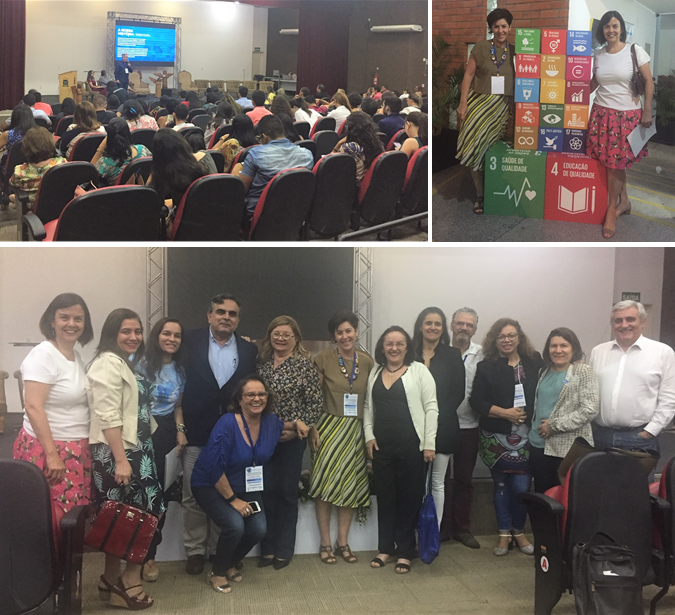For years, BIREME has been contributing to the promotion of scientific and technical knowledge in local contexts and in Primary Health Care (PHC), in consonance with the resolutions approved in the 72nd World Health Assembly, which recently took place at WHO Headquarters in Geneva, with the PHC towards Universal Coverage, with the Declaration of Astana adopted in the Global Conference on Primary Health Care 2018, and with the recommendations of the High Level Commission “Universal Health in the XXI century: 40 years of Alma-Ata”, which reaffirm “PHC as a necessary and sustainable path for achieving universal health as a right for everyone with quality, equity and social justice, with government policies that guarantee this right, respect diversity, with sufficient and equitable economic resources, thus strengthening communities as a factor of transformation of realities and that no one (citizen or non-citizen) is left out of the health system”.
For example, we mention the participation of BIREME in the IV International Congress on Primary Health Care (CIAPS), which had as a central theme the Sustainable Development Objectives (ODS) from the 2030 Agenda, as well as how to reduce the gap between knowledge and practice.
The CIAPS gathered over 600 participants, mostly professionals working with Family Health Strategies from the North and Northeast regions of Brazil, as well as students and researchers. The Congress took place in the city of Teresina (Piauí, Brazil) on May 2-5, 2019, and was promoted by the Núcleo de Estudos, Pesquisa e Extensão em Educação Permanente para o SUS (NUEPES), linked to the Universidade Federal de Piauí (UFPI).
 BIREME contributed with two workshops on the access and use of evidence for decision-making in health, using maternal mortality and mental health within the context of PHC, both of which are part of the reality of Piauí counties. In addition, a conference was given on the considerations on the clinical application of integrative and complementary practices in health (ICP), based on scientific evidence promoted regionally, with the objective of collaborating with the identification and analysis of evidence that is published in clinical studies, in the Virtual Health Library (VHL) and in other information sources. BIREME is collaborating with the Brazilian Consortium for Integrative Health Practices and with the TCIM Americas Network on a project for the elaboration of Maps of Evidence for the ICP.
BIREME contributed with two workshops on the access and use of evidence for decision-making in health, using maternal mortality and mental health within the context of PHC, both of which are part of the reality of Piauí counties. In addition, a conference was given on the considerations on the clinical application of integrative and complementary practices in health (ICP), based on scientific evidence promoted regionally, with the objective of collaborating with the identification and analysis of evidence that is published in clinical studies, in the Virtual Health Library (VHL) and in other information sources. BIREME is collaborating with the Brazilian Consortium for Integrative Health Practices and with the TCIM Americas Network on a project for the elaboration of Maps of Evidence for the ICP.
BIREME’s contribution to the Primary Health Care VHL (PHC VHL), the focus of the event, is also noteworthy. The PHC VHL is a Brazilian initiative linked to the Telehealth Brazil Networks Program, which has been contribution for over 10 years to:
“Granting broad access to a network of information sources and best evidence on PHC, in order to subsidize the processes of clinical decision making, training and management of Family Health Teams, Second Opinion professionals and of the Telehealth Brazil Networks Program; and to give visibility to contents produced within the Program’s framework.” (Source: Contribution of BIREME/PAHO/WHO for the Telehealth Brazil Program, May 2019)
In this initiative, we highlight the information source Second Formative Opinion (SFO), which manages answers to questions and queries from PHC practice within the context of the Unified Health System (SUS – Brazil), which were formerly answered by the Teleconsulting service offered by the Nuclei of the Telehealth Brazil Networks Program. The SFO are originated from the teleconsultations; they are reviewed for adequate content and language, go through peer review and are published by the PHC VHL. Currently, the collection has over 1,400 SFO available for consultation (http://aps.bvs.br).
According to Verônica Abdala, who represented BIRME at the Congress, “participating in this Congress has a special meaning for me, since it opens the opportunity of getting to know the application of BIREME’s technical cooperation in the first level of health care; in this manner we contribute to making our work reach less favored regions. In fact, missions such as this one fill me with courage to search for alternatives that may contribute to filling the enormous gap that exists between knowledge and practice in PHC”.